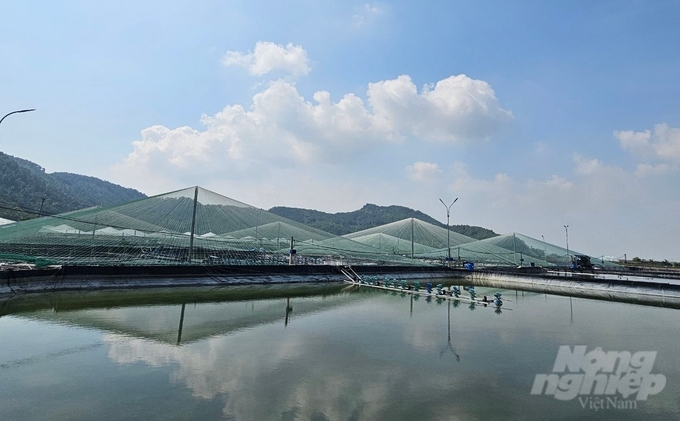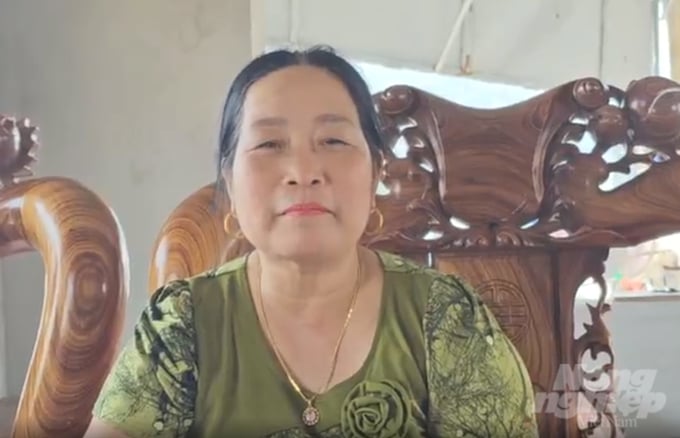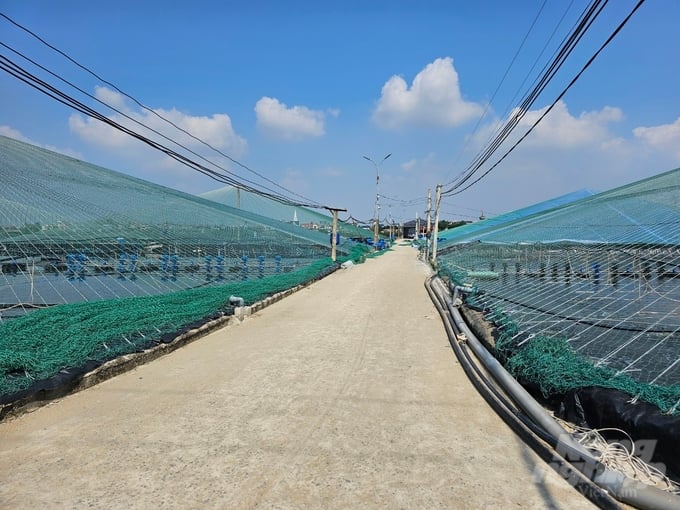May 21, 2025 | 08:28 GMT +7
May 21, 2025 | 08:28 GMT +7
Hotline: 0913.378.918
May 21, 2025 | 08:28 GMT +7
Hotline: 0913.378.918
On July 17, 2021, the People's Council of Thanh Hoa province issued Resolution No. 20/2021/NQ-HDND regarding policies to encourage the development of science and technology in economic and social development in the period 2021-2025, including whiteleg shrimp farming, to assist organizations and individuals in developing production in depth.
As a result, enterprises and individuals in the province engaged in whiteleg shrimp farming will receive 30% of the total investment cost, including costs for purchasing machinery and equipment, technology transfer (if any), infrastructure construction costs, training, technical training, and so on. The amount of assistance is limited to 3 billion VND per business, household, or individual.
To obtain assistance, the target groups must meet certain standards such as pond area for shrimp farming, aquaculture certification, newly purchased machinery and equipment that is 100% new and clearly sourced and have completed at least one crop...

Hoang Yen commune is a locality with a large white-leg shrimp farming area in Hoang Hoa district, Thanh Hoa. Photo: Quoc Toan.
However, more than two years after the Resolution went into effect, capital support for whiteleg shrimp farmers has not been achieved as intended. No homes in Thanh Hoa province have benefited from the production development support program since, according to the locals, the conditions outlined in Resolution 20 are extremely difficult to achieve.
Mr. Tran Van Dong (Phuong Cat hamlet, Thanh Thuy commune, Nghi Son town) invested about 100 billion VND in a 20-hectare whiteleg shrimp production plant in 2022, employing innovative technology. The shrimp farm owner stated that he learned and tested on his own to execute everything from design to construction to shrimp growing techniques.
"Most whiteleg shrimp farming households build their pond systems primarily through self-study and research, with few paying attention to specific standards." Furthermore, rather than getting scientific and technological expertise from any unit, shrimp farmers rely on actual experience... As a result, meeting all of the standards mentioned in Resolution 20 is extremely difficult for the people," Mr. Dong explained.

Ms. Dang Thi Huong, owner of a high-tech shrimp farm in Hoang Yen commune, Hoang Hoa, Thanh Hoa. Photo: Tam Phung.
Similarly, Ms. Dang Thi Huong (a whiteleg shrimp farmer in Hoang Yen commune, Hoang Hoa district) says that satisfying the prerequisites for receiving assistance, such as invoices, paperwork, and verifying the provenance of items, is tough.
"The lower the investment costs, the more profitable it is for shrimp farmers." Sometimes we just buy used machines, chat to each other, and then pay without regard for invoices or documentation. Now, investing fresh funds to meet the conditions for support outlined in Resolution 20 is both costly and wasteful. "Even the investment required to receive state assistance is many times greater than the assistance itself," Ms. Huong explained.
Thanh Hoa province currently has an aquaculture area of 19,200 hectares. There are 238 households among them that are involved in whiteleg shrimp cultivation employing innovative technologies. Nearly 70 households have shrimp growing fields of 0.5 hectares or more in greenhouse structures and net houses, largely concentrated in the districts of Hoang Hoa, Hau Loc, Quang Xuong, Nga Son, and Nghi Son.
According to Thanh Hoa's Department of Science and Technology, the program's allocated capital in 2023 (including support for the implementation of sophisticated technology in whiteleg shrimp farming) is around 40 billion VND. Three whiteleg shrimp farming models have been registered for approval from the beginning of 2023 until the present, however they do not match the stated standards.

High-tech shrimp pond of Ms. Dang Thi Huong's family in Hoang Yen commune, Hoang Hoa district. Photo: Quoc Toan.
"Some households meet the area requirement but lack VietGap or GlobalGap certification," noted Mr. Do Van Huan, Head of the Facility Management Department (Department of Science and Technology of Thanh Hoa). Some homes meet the farming area requirements but not the wastewater treatment system specifications. The infrastructure is in place in some cases, but technology transfer is absent, hence the requirements for benefiting from Resolution 20 are not met..." Mr. Huan spoke up.
Mr. Nguyen Ngoc Toan, Deputy Head of the Agriculture and Rural Development Department in Hau Loc district, indicated that dozens of households in Hau Loc district are investing in modern whiteleg shrimp cultivation. Based on their economic resources and practical expertise, these households mostly self-study and invest in relevant facilities. However, because the criteria outlined in Resolution 20 are rather stringent, no homes in the Hau Loc district match the requirements for policy benefits.
“Người dân đa phần tự học khi nuôi tôm thẻ chân trắng. Bây giờ buộc người dân nhận chuyển giao khoa học kỹ thuật thì họ không làm vì ngại rườm rà. Có người định đầu tư nuôi tôm thẻ chân trắng nhưng chi phí quá cao trong khi mức hỗ trợ có hạn chế nên họ không mặn mà gì. Đây cũng là điểm nghẽn trong thực hiện chính sách, cần tháo gỡ kịp thời", Phó phòng NN-PTNT Hậu Lộc cho hay.
Translated by Linh Linh

(VAN) Dong Thap farmers attained an average profit margin of 64% during the summer-autumn 2024 crop (first season), while An Giang and Kien Giang farmers followed with 56% and 54%, respectively.

(VAN) As a doctoral student doing research on renewable energy and electrification at Harvard University, the author shares his musings on electricity, nature, and countryside memories.

(VAN) The decree on Extended Producer Responsibility (EPR) ensures transparent management and disbursement of support funds, avoiding the creation of a “give-and-take” mechanism.

(VAN) Hue City rigorously enforces regulations regarding marine fishing and resource exploitation, with a particular emphasis on the monitoring of fishing vessels to prevent illegal, unreported, and unregulated (IUU) fishing.

(VAN) Hanoi People's Committee has issued a plan on reducing greenhouse gas emissions in the waste management sector with 2030 vision.

(VAN) Vietnam's draft amendment to Decree No. 156 proposes a mechanism for medicinal herb farming under forest canopies, linking economic development to population retention and the sustainable protection and development of forests.

(VAN) In reality, many craft village models combined with tourism in Son La have proven effective, bringing significant economic benefits to rural communities.